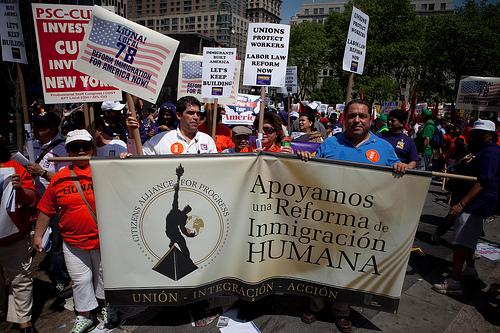Report suggests U.S. prosperity depends on increasing opportunities for immigrants
Protesters join a rally for immigration reform outside City Hall in New York City. (Photo by Flickr userJens Schott Knudsen.)
According to a recently released report, economic prosperity in the United States may be dependent on allowing increased job opportunities for immigrant.
A bipartisan group of mayors from across the country, the Partnership for a New American Economy, released four key findings from new research on immigration and the the economy.
- Immigrants with advanced degrees boost employment levels.
- Temporary foreign workers also increase employment.
- Immigrants largely do not “take our jobs.”
- Foreign-born workers pay more in taxes than they receive in benefits.
While many are concerned about the current job market in the U.S. and the effect immigration will have on it, New York City Mayor Michael Bloomberg’s chief policy advisor, John Feinblatt said there is no need for concern about immigrantion shrinking the number of available jobs.
“It just isn’t the case,” Feinblatt said. “I mean, the American Enterprise Institute, which as you know is a conservative think-tank, just put out a study with our immigration group that showed just the opposite. In fact, it showed that immigrants with advanced technical degrees that they earned in the U.S. created 2.6 jobs for Americans, so for every one foreign graduate from a U.S. university in science, technology, engineering or math fields, that meant 2.6 jobs for Americans. And even look at the other end of the spectrum: Every farm worker that we hire from a foreign country creates two to three jobs for Americans. Why wouldn’t we want those jobs?”
Claudio Carnino, an Italian technology entepreneur, was denied funding for his start-up company because investors feared it would be hard for him to stay in the country, as there is no assurance that immigrants can return to the U.S. after their visa expires. Carnino instead decided to open his company in Chile.
“Chile is investing in 400 start-ups every year, giving them $40,000 for free, just in exchange of being here in Chile for six months. Plus the money — they are really helping because they are in creating a hub of technology here in Santiago, the capital, where we have a lot of access to experts in the field. We have access to a lot of other people doing the same thing, doing start-ups, so we are helping each other. And plus, there are big companies here that invest in start-ups and make partnerships with those start-ups,” Carnino said.
Carnino commended Chile for investing heavily in foreign companies. John Feinblatt thinks many foreign countries are handling immigration better than the U.S.
“For instance, they are providing green cards to graduates of their universities that graduate in STEM fields. They are creating visas specifically for people like Claudio, what we call entrepreneur visas. If you’ve got someone with a great idea, and American capital to support them, we ought to give them a visa and see if that business has a chance of working,” Feinblatt said. “But let me make this real. You know, all the economists estimate that, for instance, there will be about 780,00 openings in engineering and tech jobs. Well, if you look at what the U.S. is producing, they’re only producing about 552,000 by the year 2018. That’s a 230,000 gap. We’re going to need to fill that in some way. It used to be the gold rush; now it’s the talent rush.”
With immigration reform and the economy being two key issues for the upcoming presidential election, it is likely that some policy change is forthcoming in the near future.
